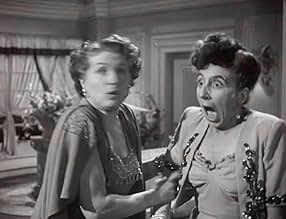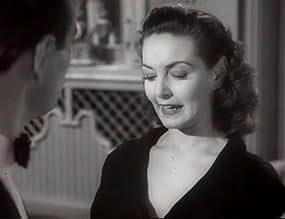IMDb RATING
5.9/10
270
YOUR RATING
Upper class young man has to resort to employment, together with his valet/butler in tow. He finds a job escourting a robot out for an evening, and they end up in a hotel and a farce ensues ... Read allUpper class young man has to resort to employment, together with his valet/butler in tow. He finds a job escourting a robot out for an evening, and they end up in a hotel and a farce ensues when roles are swapped.Upper class young man has to resort to employment, together with his valet/butler in tow. He finds a job escourting a robot out for an evening, and they end up in a hotel and a farce ensues when roles are swapped.
Anita Sharp-Bolster
- Lady Diana
- (as Anita Bolster)
Patti Morgan
- Telephonist
- (uncredited)
Geoffrey Sumner
- Well Dressed Man On Underground
- (uncredited)
Featured reviews
As a British attempt to do some American 'screwball' comedy, it falls very short of the mark. Perhaps the same vehicle in the hands of someone like Cary Grant could have made it work but not the set of actors in this. As a traditional British farce it works better but not by much, and sadly points up the fact that light comedy was not really Nigel Patrick's forte.
In a short role as a effeminate dress sales clerk, Jerry Desmonde goes as far as you could without shouting out 'gay man,' in the days of fifties cinema. Pity his later roles were mainly playing stooge to the likes of Norman Wisdom.
This type of broad slapstick farce and comedy of errors was slowly dying out to be replaced by the more subtle Ealing comedies. And wouldn't really return till the more risqué Carry Ons of the swinging sixties.
All a bit dated in all and only vaguely amusing in the sense of 'they don't make them like that any more' type of way.
In a short role as a effeminate dress sales clerk, Jerry Desmonde goes as far as you could without shouting out 'gay man,' in the days of fifties cinema. Pity his later roles were mainly playing stooge to the likes of Norman Wisdom.
This type of broad slapstick farce and comedy of errors was slowly dying out to be replaced by the more subtle Ealing comedies. And wouldn't really return till the more risqué Carry Ons of the swinging sixties.
All a bit dated in all and only vaguely amusing in the sense of 'they don't make them like that any more' type of way.
A promising cast and premise are wasted in this woefully weak effort. The absence of a sharp script and tight direction is made worse by desperate over-acting. The participants were rewarded for the time they spent on the film. Unlike the viewers.
For some reason the director and actors seemed to be under the impression that if you acted in a maniacal fashion and speeded up your delivery everything would be hilarious.Instead it is an example of how not to film a farce.It makes even Brian Rix look restrained.Irene Handel and Miles Malleson are a joy as they are working at their own usual sedate pace.However what on earth were Patrick,Holloway and Roc playing at.Even as a robot Roc was wooden ,or should that be metallic.It is difficult to believe that Stanley Holloway gave a worse performance than this.I normally enjoy watching Nigel Patrick,but not in this.He literally chews the scenery.Little wonder that the British film industry was starring down at the precipice when this film was made.films of this type would help push it over the edge.
I stumbled upon this movie one afternoon on TV. It's a pacey movie when compared to many British Movies of this era (Bernard Knowles experience as cinematographer on Hitch's 39 Steps may have benefitted him in this respect). The cast are splendid, if somewhat theatrical (English Farce), especially Miles Malleson as the dotty old inventor.
What fascinated me most was the similarities I began to notice with the acting of Leslie Banks as Cavendish with that of the exasperation of Basil Fawlty in "Fawlty Towers" a British TV show by ex-python John Cleese. The tortured expressions and heavily exaggerated body language were the first things to alert me to the "FT" connection. But there was more...
The pace increased exponentially along with the emerging complications of taking a beautiful female robot (impersonated by Malleson's neice) to a honeymoon suite in a posh hotel until the film ended in total chaos.
A foreign servant who spoke very little english and frequently misunderstood his manager's requests (Hmm, Manuel methinks!).
What fascinated me most was the similarities I began to notice with the acting of Leslie Banks as Cavendish with that of the exasperation of Basil Fawlty in "Fawlty Towers" a British TV show by ex-python John Cleese. The tortured expressions and heavily exaggerated body language were the first things to alert me to the "FT" connection. But there was more...
The pace increased exponentially along with the emerging complications of taking a beautiful female robot (impersonated by Malleson's neice) to a honeymoon suite in a posh hotel until the film ended in total chaos.
A foreign servant who spoke very little english and frequently misunderstood his manager's requests (Hmm, Manuel methinks!).
The Perfect Woman (1949) -
It really was amazing how quickly two people could fall in love back in 1949 - That was the only note I took down whilst watching this film and sadly, because it was a bit forgettable, I can't really think what else to write about it in this review.
I know that it wasn't offensive and that there was a charm to it and an element of fun, but I don't think that I could really say much about the general construction of the film.
The only characters I can recall were the professor who invented the "Perfect Woman" and who was cute in his own way, but quite typical of inventors in film and also Stanley Holloway's butler, a man who knew his place, but didn't stay there.
I'm sure that they all gave perfectly adequate performances, because otherwise I would have made a note of it and I know that Irene Handl usually delivers a great character, but perhaps there have just been too many of this type of film that meant it didn't leave a specific mark.
The actual robot needing instructions to move or do anything, was a bit silly, like the daft scene in 'Mrs Doubtfire' (1993), where Robin Williams had to keep changing personas over dinner and that was a tired humour even in 1949 as far as I'm concerned.
So while it wasn't a bad film, it really didn't make any kind of impression on me and I wouldn't bother with it again.
380.61/1000.
It really was amazing how quickly two people could fall in love back in 1949 - That was the only note I took down whilst watching this film and sadly, because it was a bit forgettable, I can't really think what else to write about it in this review.
I know that it wasn't offensive and that there was a charm to it and an element of fun, but I don't think that I could really say much about the general construction of the film.
The only characters I can recall were the professor who invented the "Perfect Woman" and who was cute in his own way, but quite typical of inventors in film and also Stanley Holloway's butler, a man who knew his place, but didn't stay there.
I'm sure that they all gave perfectly adequate performances, because otherwise I would have made a note of it and I know that Irene Handl usually delivers a great character, but perhaps there have just been too many of this type of film that meant it didn't leave a specific mark.
The actual robot needing instructions to move or do anything, was a bit silly, like the daft scene in 'Mrs Doubtfire' (1993), where Robin Williams had to keep changing personas over dinner and that was a tired humour even in 1949 as far as I'm concerned.
So while it wasn't a bad film, it really didn't make any kind of impression on me and I wouldn't bother with it again.
380.61/1000.
Did you know
- TriviaPamela Devis's debut.
- Quotes
Mrs. Butters: You and your Mars and your Jupiter. Why don't you come down to Earth for a change?
Details
- Runtime
- 1h 29m(89 min)
- Color
- Aspect ratio
- 1.37 : 1
Contribute to this page
Suggest an edit or add missing content
































